When Chen Yang was fresh out of university, China’s government rarely failed to protect lenders and borrowers. Today, Beijing is allowing the bond market to grow up, forcing Chen and others like him to become experts in credit analysis.

It was 2007, and China’s economy was expanding at a blistering 14 percent a year. At Nanjing University in eastern China, Chen Yang, a finance major, was a year away from graduation. Most of his classmates were streaming into banks and brokerages to take jobs tied to a stock market that was on fire. But at a campus recruitment presentation, an American fixed-income trader pointed Chen in a different direction: bonds.
He took the advice —and went on to ride a wave of debt growth that’s proved far bigger than he’d anticipated. From the equivalent of $1.7 trillion at the end of 2007, China’s bond market surged toward $13 trillion by the end of last year.
Now 37, Chen heads fixed-income investment at Shanghai Securities Co. “During the first few years of my trading career,” he says, “I would need my boss’s permission to do a trade over 30 million yuan [$4.5 million]. Now we very often do transactions of hundreds of millions of yuan.”
The boom in demand for borrowing came from all quarters, including state-owned enterprises, government authorities, and private-sector companies. And along the way, foreign investors have piled in: Since mid-2015 policymakers have steadily lowered barriers to entry in an effort to relieve pressure on the yuan’s exchange rate caused by wealthy Chinese moving money out of the country.
Recently the market has been hit by record defaults, which are starting to reshape how debt is priced. In developed nations, it’s taken for granted that borrowers pay different rates based on their creditworthiness. In China, there was for years an implicit government guarantee on almost all borrowing, lest corporate failures trigger social unrest and endanger the stability of the whole system.
This story is from the {{IssueName}} edition of {{MagazineName}}.
Start your 7-day Magzter GOLD free trial to access thousands of curated premium stories, and 9,000+ magazines and newspapers.
Already a subscriber ? Sign In
This story is from the {{IssueName}} edition of {{MagazineName}}.
Start your 7-day Magzter GOLD free trial to access thousands of curated premium stories, and 9,000+ magazines and newspapers.
Already a subscriber? Sign In
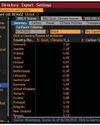
See Which Countries Are Falling Behind On Climate Change
Under the Paris Agreement, 190 countries and the European Union pledged to take steps to hold the global temperature rise to less than 2C (3.6F) from preindustrial levels—and preferably 1.5C.
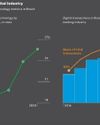
Billionaires Vie for the Future of Brazilian Finance
An escalating battle between two billionaires is upending the financial community in São Paulo, Latin America’s wealthiest city.

Ford Foundation's Darren Walker: ‘We Have to Get Uncomfortable'
DARREN WALKER, 62, disrupted his Wall Street life more than 25 years ago when he left what is now UBS Group AG to volunteer at a school and eventually pursue a career in community development and philanthropy. Since 2013 he’s been at the pinnacle of the philanthropic world as president of the Ford Foundation, created by the family of automaker Henry Ford during the Great Depression to advance human welfare.

Fueling the Ener Transition
I MAY BE BIASED, but some of the most important research and data on the Bloomberg terminal lies in one of its lesser-known functions: {BNEF }

Dig Into Analysts' Estimates for Disruptive Companies
THE PANDEMIC ERA generated a whole wave of disruptive companies as it accelerated the introduction of new products and services in areas including artificial intelligence, digitization, electronic payments, online meeting platforms, and virtual currencies.
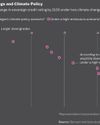
Climate Risks Come for Sovereign Credit
FOR YEARS climate scientists have warned about the ferocious wildfires and hurricanes that are now overwhelming many communities. Today alarms are ringing about a related financial danger: risks lurking within government bonds, the biggest part of the global debt market.

Responsible-Investing Pioneer Lydenberg Says ESG Needs An Upgrade
STEVE LYDENBERG’S passion for social change was inspired by anti-Vietnam War demonstrations, consumer boycotts, and the movement to divest from apartheid South Africa. But he didn’t take to the streets. Instead, Lydenberg turned to the world of finance to help catalyze societal change.

Engine No. 1's Grancio: ‘People Will Appreciate an Economic Argument'
ENGINE NO. 1 sent shock waves across corporate America in May when the fledgling investment firm won a boardroom battle with Exxon Mobil Corp., securing three seats on the oil and gas giant’s board after purchasing only about $40 million of its stock.
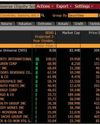
Find Out Which Companies May Ramp Up Payouts After Covid
AS THE PANDEMIC DISRUPTED business last year, many companies cut or suspended dividends. Which will boost their payouts when economies pick up again?
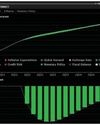
Get Into the Minds of Central Bankers as They Navigate Shocks
HAVE YOU EVER WONDERED how central bankers forecast the impact of shocks on the economy?